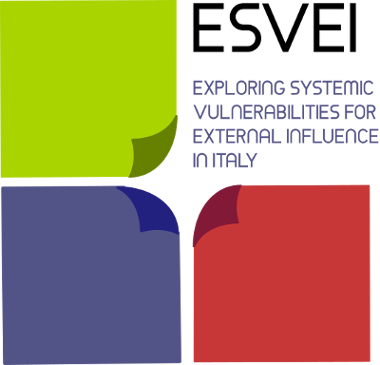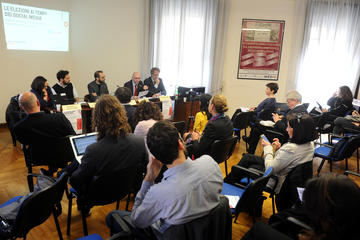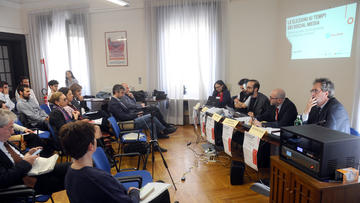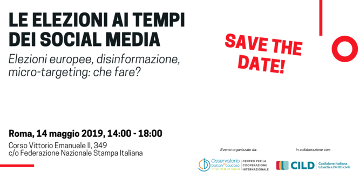ESVEI tackles structural issues that in recent years are increasing the vulnerability to external interference of democratic processes, taking Italy as a case study.
It aims at increasing awareness, initiating policy debates, and providing sensible, forward-looking policy recommendations in three domains that are central to democratic processes in modern societies, but that, due to inadequate regulations and poor practices, needlessly expose such processes to meddling:
social media and disinformation;
transparency of funding and lobbying;
cybersecurity
In depth
INTERVIEW Elections and public agenda: a story of a media synergy
Fazıla Mat | 2/7/2019Social platforms and traditional media have equal weight in determining the public and electoral agenda, often acting in synergy manner. Sara Bentivegna, Professor of Communication Theories and Digital Media and Political Communication at the Sapienza University of Rome, explains
Interview Elections legitimacy in the age of digital dominance
Sofia Verza | 23/5/2019Damian Tambini, professor at the London School of Economics, discusses with ESVEI the policy challenges posed by digital dominance for election legitimacy. Transparency, fairness and election monitoring in the age of “surveillance capitalism”. An interview
Elections at the time of social media, speakers' talks
Chiara Sighele, Rossella Vignola | 2/7/2019We publish the detailed report of the speakers' talks at the policy workshop "Elections at the time of social media. European elections, disinformation, micro-targeting: what to do?", which took place last May 14th in Rome, within the project ESVEI promoted by OBC Transeuropa/ CCI
We need to regulate online political advertising
Redazione | 24/5/2019A group of experts met to discuss some problems with online information spaces and to submit concrete proposals to political decision-makers.
If justice on online information becomes a private matter, we have all lost
Guido Scorza* | 16/5/2019The information system is one of the most complex and delicate elements of a democracy. The only real remedy for disinformation is education to the critical spirit and the re-thinking of the media system. A comment by Guido Scorza
xxx The conditions for a pluralistic digital future: interoperability, transparency, and control over data
Giorgio Comai | 13/5/2019A reflection on the necessary conditions to be not only "users", but also "citizens" of the digital spaces in which we live: owners of rights, owners of one's own personal data, free to choose which services to use, which suppliers to turn to, and free to know what criteria determine what appears on our screens
Rome, May 14th, 2019. Policy workshop: Election at the time of social media. European elections, disinformation and micro-targeting: which actions?
"Fake news" or disinformation is one of the most pressing issues of our times. Building on the materials of the Resource Centre on Press and Media Freedom in Europe, OBCT devoted its latest special dossier to this topic
Online political advertising in Europe
An overview on online political advertising in the run-up to the EU elections through a series of data-driven articles realised within the European Data Journalism Network
Social media advertising: more than half a million euro spent on the European elections | Openpolis
How parties court voters online | Spiegel online
How much did the European institutions and parties pay for ads on Facebook? | OBC Transeuropa
Political advertising on Facebook in South-East Europe | OBC Transeuropa
Facebook´s transparency is lacking – this is why it still is hard to examine political advertising | Journalism++
Facebook has become political parties’ main advertiser | VoxEurope
Even as knowledge of social media’s unintended consequences spreads, the surveillance-based economic system underlying them is constantly expanding, and users may not fully understand the choices that they are making, argues @RonDeibert in Power 3.0: https://t.co/X8m8VXNYhL
— Shanthi Kalathil (@ShanthiKalathil) 8 febbraio 2019
“It’s cheaper to open an internet troll farm than to build tanks and invest in sustainable economic growth. And if the Russians can cause so much damage with so little, others who see the United States as an enemy are sure to follow suit.”
— Julia Davis (@JuliaDavisNews) 29 gennaio 2019
By @apolyakova https://t.co/POXleGsO0U
How are governments responding to social medial manipulation? ComProp researchers @sbradshaww, @lmneudert, @pnhoward have completed an analysis of recent legal and regulatory interventions.
— ComProp Research (@polbots) 21 gennaio 2019
Read it on @STRATCOMCOE: https://t.co/MTvKVXtWSl pic.twitter.com/1xcJiObO5I
1/We still don’t have the data to untangle the causal role of news publishers, social media platforms, the economic incentives around clickbait, media literacy, education, policy, among myriad other possible factors. What is their relative importance? #causalinference #fatml https://t.co/AL1hwwpXZn
— Dimitra (Mimie) Liotsiou (@mimieliotsiou) 16 novembre 2018
"Before they destroy political speech".
— Fabio Chiusi (@fabiochiusi) December 4, 2018
I mean: seriously?
Chatbots? https://t.co/D8CnlbDbYy
It’s instructive that by far the most common excuse people give for why they’re still on Facebook is “they’re holding my friends and family hostage”. It’s not “I think they’ll get better” or “actually, Facebook is great”. It’s “they’re making me choose between people and ethics”.
— DHH (@dhh) 30 gennaio 2019
They are of course mimicking the language used by many democratic governments these days. Not good. https://t.co/iBlG23Iih3
— Rebecca MacKinnon (@rmack) 10 gennaio 2019
This @Independent headline saying Facebook spending won the Brexit referendum for Leave is based on a badly flawed analysis and should not be taken seriously. A short thread on why 1/n https://t.co/wjCpwV50af
— Frederik Hjorth (@fghjorth) 6 dicembre 2018
NYT series about Moscow’s plot to ‘tear West apart’ is a jewel of psychological projection https://t.co/oJBuAh2Fw4 pic.twitter.com/khlGrRoMoY
— RT (@RT_com) 16 novembre 2018
#Russia's state TV:
— Julia Davis (@JuliaDavisNews) 28 dicembre 2018
Panelist points out that the leading countries of the world are now headed by the politicians with nationalist leanings, mentions Trump.
With sarcastic satisfaction, state TV host Evgeny Popov adds:
"Putin installed them. It's all thanks to our interference." pic.twitter.com/kkE19HiXev
So I was invited to speak at Google about "the elite charade of changing the world."
— Anand Giridharadas (@AnandWrites) 20 ottobre 2018
I decided to bring up the topic no one wanted to discuss: Google being a monopoly that may need to be broken up.
That's when it got awkward.https://t.co/8mClIEJMVB pic.twitter.com/ultc021V0f
Here is a quantitative study showing that "Fake News" likely has less impact on voting than once expected, and that we should be more wary of "elite misinformation".
— Alex Stamos (@alexstamos) February 7, 2019
I'm sure this will get as much coverage in the NY Times and WaPo as all the non-quantitative OpEds they've run. https://t.co/qWY0f4arLA
The project ESVEI is supported in part by a grant from the Foundation Open Society Institute in cooperation with the OSIFE of the Open Society Foundations. The contents of this publication are the sole responsibility of Osservatorio Balcani e Caucaso Transeuropa.
















